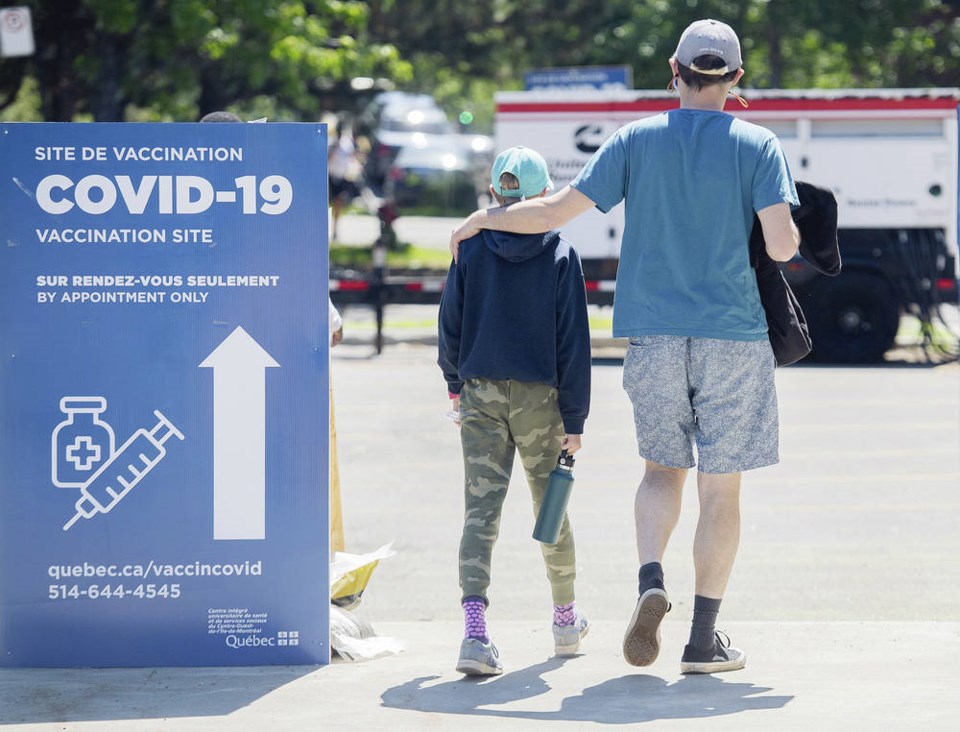The interval for second doses of COVID vaccine will change to eight weeks from 16 to ensure everyone can have a booster shot by the end of summer, Dr. Bonnie Henry, B.C.’s provincial health officer, said Thursday.
Invitations for booster shots are going out now and are being sent first to about 400,000 people most at risk — seniors and people who are clinically extremely vulnerable, such as people who are undergoing chemotherapy.
“Second doses are incredibly important for all of us, and we need to make sure that those who are most at risk get this added protection, as soon as possible,” Henry said.
The province announced 378 new cases Thursday, including nine in Island Health.
Just over three million doses of COVID vaccine had been administered by Thursday, 156,000 of which were second shots. Henry said the number of people who have received a first dose, 65 per cent of adults, is high enough that the province has been able to speed up delivery of second doses.
B.C. announced in March that the interval between first and second shots would be up to 16 weeks so that more people could be protected with first doses amid limited vaccine supply, but an increase in supply prompted a shift to 13 weeks, and now eight weeks.
The province is providing second doses to residents and staff in long-term care within the next two weeks, as well as to First Nations communities, and remote and rural areas where the entire community was offered immunizations.
While the National Advisory Committee on Immunization says it’s preferable to use the same product for first and second doses, “in some cases, that isn’t possible,” based on adverse reactions or availability, Henry said. If that is the case, there is evidence that the same type of vaccine can be used, she said. For Moderna, that would be Pfizer. “In some situations, you may be offered Pfizer vaccines instead of Moderna,” said Henry. “I would encourage people to take the Pfizer if it is offered.
“I just want people to be aware that this may happen, and that we are confident that it is safe and effective.”
Henry asked people who first received AstraZeneca to “hold tight” for a few more days because clinical trials are showing people have a “better response with a slightly longer interval between doses,” of up to 12 weeks.
The province is awaiting the results of studies, particularly in the U.K., and expects to have more information by the end of next week to advise people who received AstraZeneca, so they can make an informed decision on whether to have AstraZeneca, Pfizer or Moderna as a second dose.
Henry said the province will have enough AstraZeneca vaccine to provide second doses for everybody who wants one. Expired AstraZeneca stocks that have been a problem in Ontario are not an issue in B.C., which has saved active stock for second doses, said Henry. That stock does not expire until the end of June. “So we still have a little bit of time, so people can make the best decision.”
Both Henry and B.C. Health Minister Adrian Dix called for people to register with the province’s Get Vaccinated program.
“I can’t overemphasize the importance right now of getting registered in our immunization registration system — it’s your ticket to getting your second [vaccine],” Henry said.
On Thursday there were 3,543 active cases across B.C.; 286 are in hospital, including 88 in intensive or critical care.
Another seven people in the province have died of COVID‑19, two in the Vancouver Coastal region and five in Fraser Health, for a total of 1,690.
There are four outbreaks in long-term care, assisted and independent living and three in acute-care settings in the province.
The province is working on allowing British Columbians to access their immunization records electronically; some care providers and public health officials already have that access.
> Register for COVID-19 vaccinations online at gov.bc.ca/getvaccinated, or phone 1-833-838-2323, 7 a.m. to 7 p.m. Everyone age 12 and up is eligible to register.



